Creatine has been proven to be safe and effective for building muscle mass but research suggests that it can do so much more (1).
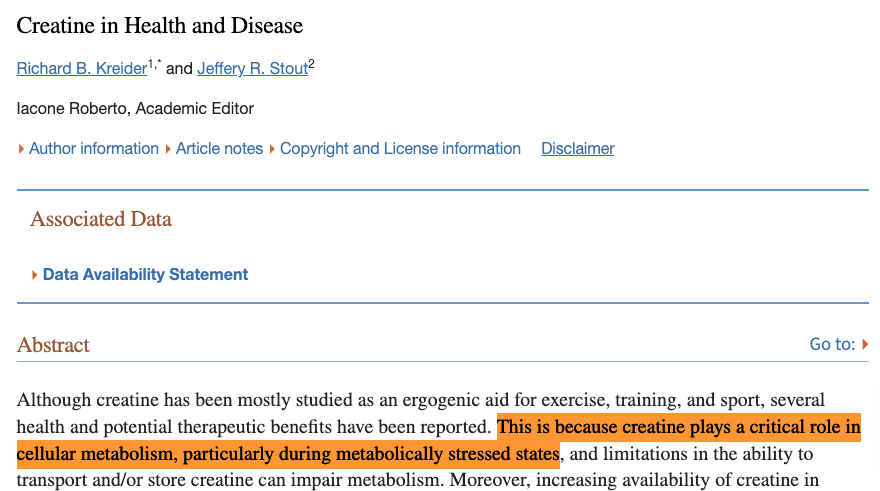
In fact, I can’t help but think about thyroid patients when I read about the benefits that creatine provides.
Most of the benefits target some of the most pressing symptoms that thyroid patients face like weight gain, bone loss, depression, inflammation, and more.
What makes this even more exciting is that outside of the body build community (which is where this supplement is primarily used) it doesn’t get the attention it deserves!
Well, today that ends.
We are going to be discussing the profound benefits that creatine can have on more than just muscle mass and discuss why I believe it should seriously be considered by all thyroid patients.
Sound good?
Let’s jump in:
DOWNLOAD FREE RESOURCES
Foods to Avoid if you Have Thyroid Problems:
I’ve found that these 10 foods cause the most problems for thyroid patients. Learn which foods you should avoid if you have thyroid disease of any type.
The Complete List of Thyroid Lab tests:
The list includes optimal ranges, normal ranges, and the complete list of tests you need to diagnose and manage thyroid disease correctly!
Creatine Basics: Yes, You Need To Know This
First things first…
What is creatine?
Creatine is one of the most well-studied supplements on the market with over 1,000 studies highlighting its beneficial effects and safety profile.
As I mentioned earlier, it’s primarily thought of as a bodybuilding supplement where it has been scientifically proven to help build more strength, increase muscle mass, improve athletic performance, and prevent fatigue (2).
Even the most battle-hardened anti-natural therapy doctors and scientists out there will still recommend creatine for its huge database of scientific studies.
You simply can’t deny that this supplement works.
While the benefits I listed above are quite impressive (who doesn’t want to build more muscle mass and lose weight?), emerging research is suggesting that creatine is able to do so much more.
But in order to understand why that is, you really need to have a basic understanding of how creatine works.
Some people think of creatine as a steroid which couldn’t be farther from the truth.
Creatine is simply an amino acid.
Yep, just a simple compound that combines to form proteins that are then used by your cells and body.
But this amino acid has some special features that aren’t shared by other amino acids.
One of its main benefits is that it can help your body produce energy in the form of ATP by being transformed into phosphocreatine (3).
Phosphocreatine is then used as a rapid source of ATP that can be mobilized and used in cells that have a high demand for energy.
This is different from other sources of energy production like the breakdown of sugars or fats which take a lot longer.
For this reason, creatine is often used by athletes to provide them with an extra boost to energy production as ATP to give them an edge over their competitors.
If you know anything about human physiology, you’ll know that every cell in your body has a need for ATP and energy, not just your muscles.
This includes important tissues like your thyroid (which needs it to produce thyroid hormone) and the brain!
And while the majority of creatine is stored in the muscles, we know that it is also found in other tissues as well, including the brain.
All of these other tissues can benefit from faster and quicker energy production which is probably why creatine is so effective for treating certain medical conditions (which we will discuss in just a minute).
It just so happens that the tissues that benefit from creatine use are also the tissues that tend to become dysfunctional from both low and high thyroid states.
So if you are a thyroid patient looking to take your supplements to the next level, you’ll want to pay close attention to what we are about to discuss.
6 Proven Benefits of Creatine Use
#1. Creatine impacts muscle mass and body composition.
I know I said we would talk about more than just muscle health but I can’t skip an opportunity to talk about how creatine can help you lose weight.
Obviously, this is a huge concern for many thyroid patients because hypothyroidism frequently leads to treatment-resistant weight gain that is stubborn and very difficult to treat.
This benefit on body composition is mediated in several ways including through creatine’s ability to slow down or halt the age-related decline in muscle mass.
This unwanted phenomenon is known as sarcopenia (4) and it’s something that every single person reading this will have to contend with.
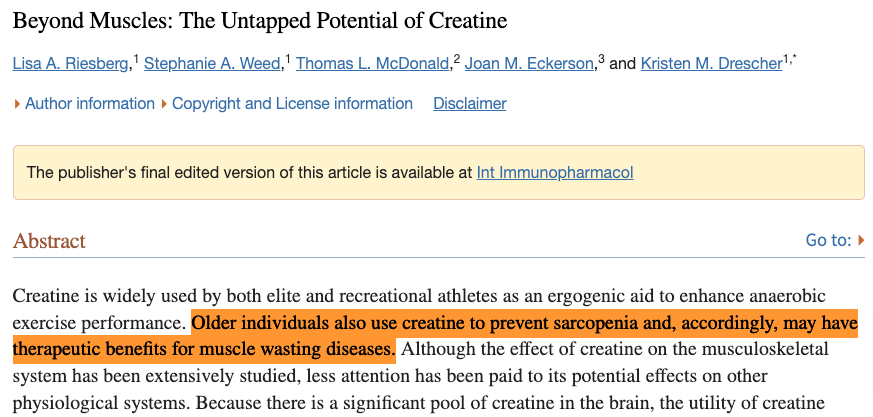
As you age your muscle mass will start to decline which means you will more easily gain weight and become susceptible to metabolic conditions like diabetes, metabolic syndrome, and more.
This is also why, by the way, it becomes more difficult to lose weight as you get older!
Yes, your thyroid is certainly contributing but you can’t discount the impact that muscle mass has on body weight and body composition.
Muscle is an incredibly active tissue that is constantly burning up energy.
When muscle mass declines, you will see a decline in your metabolism as well.
What’s amazing here is that the combination of creatine used at 5 grams per day (we will talk more about dosing later) with resistance training increases lean muscle mass at any age.
Researchers have tested in both old and young people and all populations benefit.
This means you don’t have to be a fit 20-year-old with a super fast metabolism or lift heavy weights to see these benefits.
You just need to take the creatine and put some form of resistance against your muscles (anything greater than your body weight) to see the benefits.
The more muscle mass you build the higher your metabolism will be and the easier it will be for you to lose the extra weight that your thyroid packed on.
So is creatine considered a weight-loss supplement? Not exactly, at least not in the way you are probably thinking.
It has the potential to help people who are overweight lose weight but it will also help those who are underweight gain weight by influencing muscle mass.
#2. Creatine makes your bones stronger.
This benefit is particularly important for women who suffer from age-related decline in bone mass and for thyroid patients who are at increased risk for developing osteoporosis.
One study showed that creatine supplementation, when combined with resistance training, increased the strength of their bones and bone density in postmenopausal women (5).
The population of people who read my posts is right within the range of peri-menopause to menopause which means this information is probably applicable to you right now!
And even if you are a man reading this, it’s never a bad idea to improve the overall strength of your bones.

Menopausal women, though, are the most crucial population when it comes to managing bone density so this is a big deal for them.
This potential benefit on bone health also has special application to certain thyroid populations including those with a suppressed TSH for thyroid cancer and in patients with hyperthyroidism and Graves’ disease.
Creatine is worth looking into solely as a way to improve bone health because the side effects of bone loss medications aren’t pretty.
The most common medication used to treat osteoporosis, known as bisphosphonates, cause problems like nausea, and trouble swallowing, and may even irritate the esophagus and lead to esophageal inflammation.
If you have to use them then you have to use them, but why not take steps to try and prevent the need for them later on with an incredibly safe supplement?
#3. Creatine provides neuroprotective benefits.
Next up, creatine has been shown to have neuroprotective benefits.
In other words, it keeps your brain healthy.
Studies have shown that supplementation with creatine crosses the blood-brain barrier and increases creatine levels in the brain.
This is important because not all supplements do this!
Many supplements get to other tissues in the body but the blood-brain barrier blocks their uptake into brain tissues.
This is exactly why magnesium l-threonate exists because many other forms of magnesium do not enter the brain.
Creatine has been actively used to treat mild to moderate conditions like depression (6) and has even been shown to be beneficial for more serious brain conditions like traumatic brain injury, Huntington’s disease, ALS, and Parkinson’s disease.
When it comes to thyroid patients, the benefits on depression and cognition should pique your interest as these are both symptoms commonly associated with hypothyroidism.
The exact mechanism for how and why it’s working is not completely understood but it’s probably mediated through its impact on enhanced neurological energy production and its influence on something called the mitochondrial permeability transition pore.
To simplify a very complex and poorly understood topic, the more ATP and energy that your brain produces, the better.
And creatine helps it do just that.
If you are someone suffering from brain fog, depression, anxiety, or any other thyroid-related brain symptom then creatine would be worth a try.
Especially if it means it may be used as an alternative to prescription medications like SSRIs and SNRIs which have dubious benefits and may also negatively impact thyroid function.
#4. Creatine acts as an anti-inflammatory agent.
Number 4! Creatine acts as an anti-inflammatory agent.
What does this mean?
It means that it acts to reduce the inflammatory cascade (7) that is triggered by a number of different medical conditions and disease states.
Inflammation is really at the heart of just about every important disease you can think of including thyroid disorders like Hashimoto’s thyroiditis.
If you’ve been following me for any length of time then you know that the damage caused by Hashimoto’s is caused by immune dysfunction which leads to inflammation in the thyroid gland.
The anti-inflammatory effect that creatine has is so powerful that some studies show that it has similar anti-inflammatory effects as non-steroidal anti-inflammatory drugs.
Non-steroidal anti-inflammatory drugs, or NSAIDs for short, are a class of medications that I’m sure you are very familiar with even if you don’t know them by this name.
Medications like ibuprofen, naproxen, and aspirin fall into this class.
Ibuprofen is not really thought of as a treatment for Hashimoto’s, but it does have uses in some other conditions like subacute thyroiditis.
The main problem with many of these NSAIDs is that they can cause GI-related side effects and increase your risk of serious bleeds.
There is also some question as to whether or not they negatively impact thyroid function as well by influencing thyroid binding proteins.
At the end of the day, it’s best to avoid using medications if at all possible, especially in favor of more natural options.
Imagine using a much safer alternative like creatine to manage inflammatory-related conditions like arthritis, back pain, headaches, migraines, joint pain, toothaches, etc.
Creatine’s safety profile makes it a much better alternative than both NSAIDs and even steroids.
And, even if its use doesn’t negate the need for these medications, it may still allow you to get by with a lower dose and, therefore, fewer side effects.
Creatine may also have a special benefit to certain thyroid patients who suffer from joint pain as well as muscle pain.
I personally have had issues with back pain and I can tell you that daily creatine use has helped me.
#5. Creatine positively impacts the innate immune system.
This is another big one for thyroid patients, specifically those with Hashimoto’s thyroiditis.
Creatine has been shown to act on the immune system and is considered to have immunomodulatory potential (8).
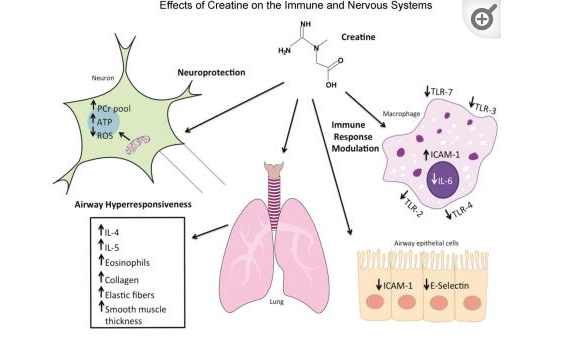
More specifically, it has been shown to down-regulated something called toll-like receptors.
These are the same receptors that, when dysfunctional, lead to autoimmune diseases like Hashimoto’s and Graves’.
This means creatine may have the potential to be used as a treatment for balancing the immune system in those with these autoimmune thyroid conditions!
And when you look at the numbers, both Hashimoto’s and Graves’ disease account for the majority of cases of both hypothyroidism and hyperthyroidism making this a very interesting treatment.
As you probably are all aware if you have one of these conditions, there are very few actual treatments that target the immune component of these diseases.
Most of the treatments focus primarily on the thyroid function aspect while ignoring the more important immune component.
We may be able to add creatine to the list of thyroid-altering treatments along with CBD, LDN, vitamin D3, black seed oil, pycnogenol, and more.
On top of this benefit of toll-liked receptors, creatine has also been shown to alter the release of inflammatory cytokines by influencing the NFkb pathway.
For perspective, this is the same pathway that turmeric (curcumin) acts on to reduce inflammation and curcumin has over 1,000 studies showing its efficacy as well.
#6. Creatine improves skin health and may act to slow down the aging of the skin.
This one may seem a little vain but I still think it’s important!
Creatine has anti-oxidant properties which, when combined with its benefit on energy production in the dermis of your skin, can serve as an effective anti-wrinkle intervention.
We know that stressors like sunlight decrease creatine kinase activity in your skin cells.
This activity can be restored with the use of creatine which means your skin cells can better protect themselves.
Researchers have even tested topical creatine (which is just placing creatine directly on the skin) which has been shown to stimulate collagen and influence gene expression directly.
Your skin is the biggest organ in your body and it is often neglected.
Both hypothyroid and hyperthyroid states can steal away your beauty by influencing your skin health, and the shape of your face, and even give you a prototypical tired look.
Creatine may be one way to fight the overall decline in skin health and rapid aging that comes with thyroid disease.
How can you get all of these BENEFITS?
Creatine is an extremely inexpensive and safe supplement and you can get it just about anywhere including online at places like Amazon.
The ideal dose is 5 grams taken each day with water.
Some people recommend loading with higher doses but it’s not really necessary as long as you are consistent in taking it each day.
Creatine comes in a white powder, dissolves easily in water, and doesn’t have a strong taste making it incredibly easy to take.
You’ll find many different forms of creatine on the market but the cheapest and most effective is creatine monohydrate.
Look for any supplement which contains ONLY this formulation with no added ingredients.
Make sure to check the supplements fact panel to confirm.
My personal recommendation would be to strongly consider using creatine, even if you don’t lift weights, for conditions like:
- Autoimmune disease (especially Hashimoto’s thyroiditis and rheumatoid arthritis)
- Any inflammatory or pain condition
- Any Skin-related conditions (especially acne)
- Any form of depression or mood-related problem
- Obesity (especially when combined with diet and exercise)
- And metabolic conditions like diabetes
Take 5 grams each day and enjoy the benefits it provides.
Now I want to hear from you:
Have you taken creatine before or is this the first time you’ve heard of it?
Did you know that it can potentially benefit your thyroid?
Are you planning on taking it after reading this information?
Let me know in the comments below!
Scientific References
#1. ncbi.nlm.nih.gov/pmc/articles/PMC7910963/
#2. ncbi.nlm.nih.gov/pmc/articles/PMC4915971/
#3. ncbi.nlm.nih.gov/pmc/articles/PMC1319235/
#4. ncbi.nlm.nih.gov/pmc/articles/PMC9958770/
#5. pubmed.ncbi.nlm.nih.gov/34107512/
#6. ncbi.nlm.nih.gov/pmc/articles/PMC6093191/
#7. ncbi.nlm.nih.gov/pmc/articles/PMC8839648/
#8. ncbi.nlm.nih.gov/pmc/articles/PMC7996722/
#9. pubmed.ncbi.nlm.nih.gov/22151935/
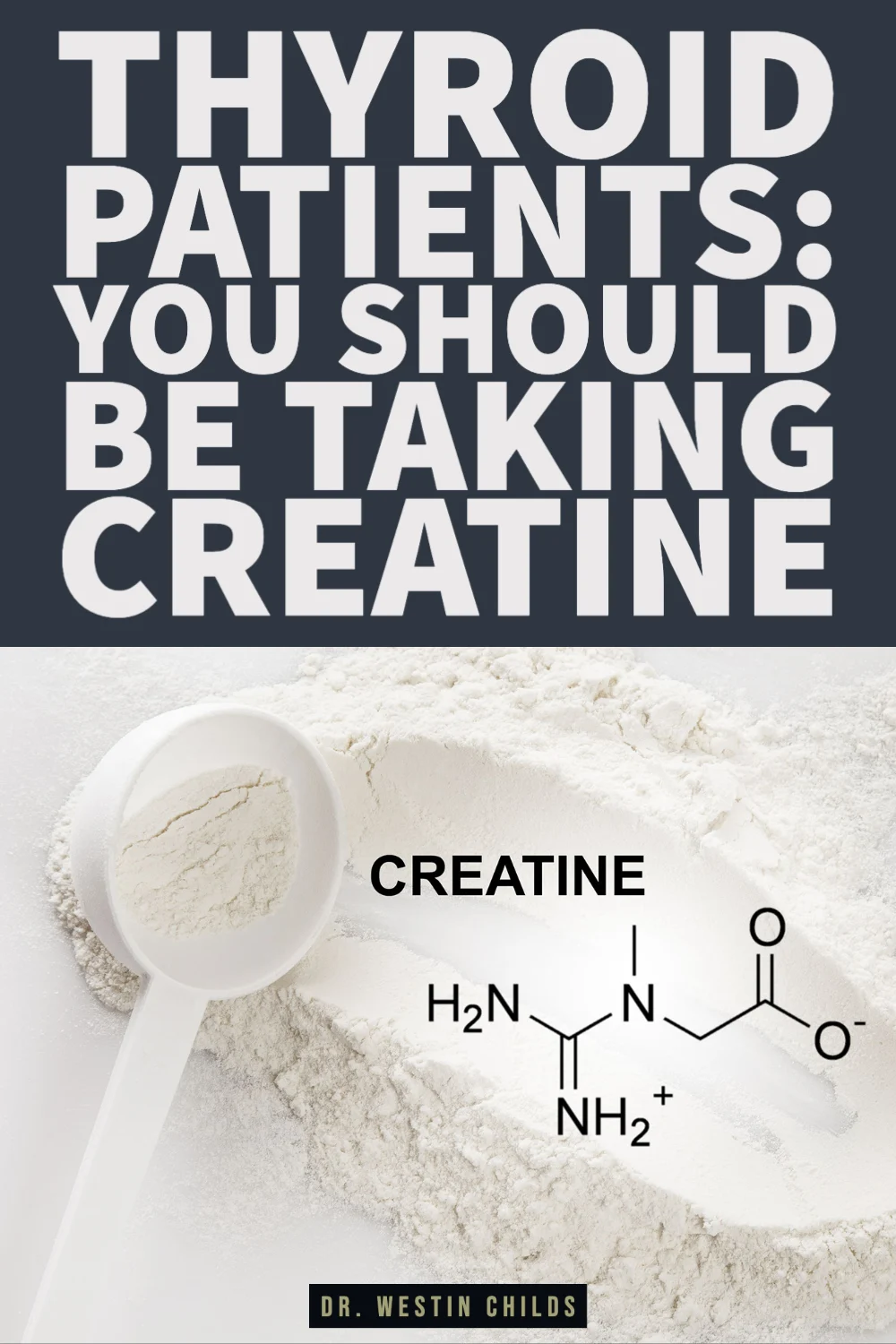
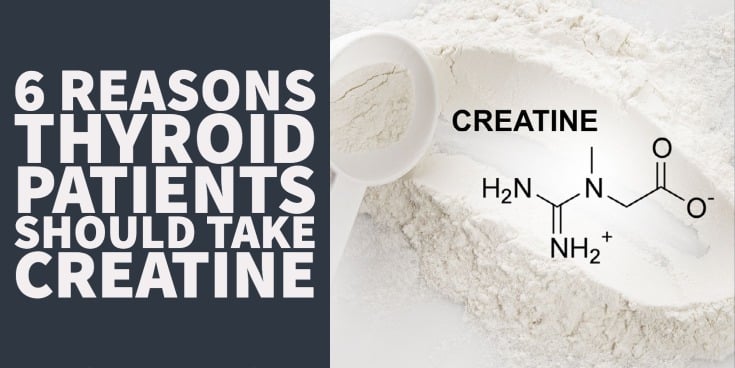






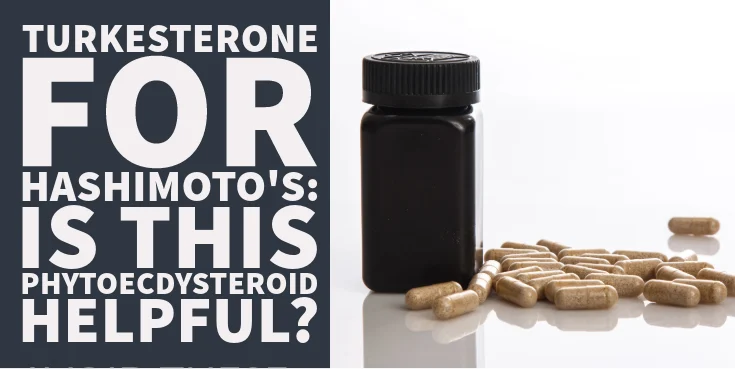

I had been taking NatureThroid and doing the best I ever had until due to a shortage and problems getting it my Nurse Practitioner put me on 150 mcg of Levothyroxine. I began to get tired and it didn’t work the same so went to see a Specialist. He said my thyroid was too high and lowered dose to 112 mcg in February. For 6 weeks now I’m feeling like I’m going to collapse and die, not feeling well or myself. Have no desire to do anything. B/P 126/64, TSH 0.148, Free T4 1.42, no Free T3 check or Reverse T3 and now has lowered my dosage again to 100 mcg as of yesterday. I tried reading your article but my brain can’t comprehend it enough to understand so not sure what I need to do or ask for. I would have to feel better to die! Specialist says my TSH is still too high. I felt better on the higher dosage. I don’t know what to do now or where to turn for help or guidance. I am a 74 year old female who’s been on thyroid meds for over 20 years for hypothyroidism.
Hi Noemie,
Please see this article which outlines how to find a thyroid literate doctor: https://www.restartmed.com/how-to-find-a-doctor-to-treat-your-thyroid/
You must get your Reverse T3 tested. If too high, my doc said to stop all meds for 1 week then restart. You’ll have to rest all week. Please find a functional GP like Dr Westin said as had same issue and you need proper treatment.
I understand that creatine can increase body weight due to water retention. As a thyroid patient this seems like the last thing I need. I struggle to lose weight and water retention is difficult for me to lose. Your thoughts please.
Hi Betty,
Creatine can cause some water retention in your muscles, that much is true, but the benefits obtained over time would far outweigh any small change experienced on the scale initially.
The scale is only helpful insofar as it helps to define your fat mass but it does a pretty poor job at doing that and mostly serves as a source of anxiety for many people.
I wouldn’t get too caught up in the idea that creatine use may cause some water retention in muscle mass but if that’s something that you are very concerned about then may want to skip using it.
I have not tried creatine before, but I do have a thyroid condition so if it can help with some of the conditions then it is worth a try.
Is there any “don’t does” when using creatine? Can I still take a pre workout? What else should I do or not do?
Thanks
Hi Eric,
Yes, you can still use your pre-workout and there’s not much to change once you start taking creatine. It’s very well tolerated and safe. The only thing you need to be aware of is that it shouldn’t be used if you have advanced kidney or liver disease but if you are otherwise healthy, there are no issues.
I’ve had a full Thyroidectomy and also resistance train 4 days a week. I’ve been considering adding creatine to my supplements and now after reading this will definitely be adding. I’ll post back in 6-8 weeks with any results.
Hi Elisha,
Sounds like a good plan!
Greetings – I am using Creatine for weight lifting after 15 yr hiatus. Hypothyroidism status. Have been taking 5 g per day for a few months now. Noticed strength gains . Question , taking time released product by NOW, I noted constipation with the power 100% creatine mono. So switch and that’s not an issue. Any thoughts to time released . Many Thxs !
What is the best time of day to take Creatine? I take NP Thyroid in the morning as soon as I wake up. One hour later I take EAA’s before lifting. I was told I could take Creatine 20 minutes after EAA’s and it wouldn’t prevent absorption of EAA’s. Would some other time of day be better? Also, which is the best to avoid stomach cramping?
Thank you for your article….I will give this a try….I have had hypothyroidism for 15 years and long haul covid, which my doctors have said they don’t know how to address, for 2 years….My symptoms are intense…Fatigue, anxiety, nausea, muscle pain, esp. legs…Perhaps, this will help both….
What brain of creatine do you recommend. I had a thyroidectomy in 2018. My number are never good. I am tired and fed up. My medication dosages keeps changing currently I am taking 175 mg Tirosint M-T and 200 mg Sa-Su. My skin is horrible at this point I am willing to try anything.
Thank you
Hi Velvet,
I personally use this one: https://amzn.to/3BOWEbF
But any version of creatine monohydrate will do.
Hi Dr. Child’s,
I have suffered with hoshimoto’s, hypothyroid, weight gain after menopause and fatigue for some time now. I have heard that creatine could help, but I have been afraid to try it because I have had kidney cancer and had a partial nephrectomy 5 years ago and I had read somewhere that creatine could be hard on the kidneys. Is it safe for me to take it?
Hi Kathy,
Creatine doesn’t impact the kidneys at all but it shouldn’t be taken if you have chronic kidney disease.
Dear Dr. Childs,
If creatine doesn’t impact the kidneys at all, why should people with chronic kidney disease refrain from taking it? Is it because it turns into creatinine which would impact your eGFR calculation?
I do have hypothyroidism and take Levothyroxine, I also have CKD stage 4, how would creatine affect the CKD?
Thank you
Hi Doris,
Unfortunately, those with CKD should not take creatine.
Ive been reading and subcribed to your page but if I took everything you talk about I woud be taking 20 pills a day.How do I decide which is best?I def have adrenal/cortisol issues,Im on 88mcg of synthroid waiting to raise it to 100 to see if that will improve my numbers,hairloss,weiht gain in my midde section including back,neck,ect
Hi Ruth,
It’s all about prioritizing symptoms and using trial and error to see what works for you. The combination of supplements that you need will be different from the next person and the only way to figure out what works best is to give them a try in, hopefully, some systematic way.
I have active hyperthyroidism (Graves) but am wondering if creatine also has beneficial effects on this type of thyroid condition. Since you have only mentioned Hashimoto’s.
Thank you
Your content has helped me a lot to deeply understand this thyroid journey.
I take synthroid and Liothyronine first thing in the morning. How long should I wait until I can take Creatine so it won’t interfere with the thyroid meds? Thank you in advance!
Hi Claudia,
At least 30-60 minutes is ideal.
Hi,
There’s a study on young healthy adult +-27 years old that took Creatine for 1 week. The T3 level reduced and T4 hormone increased. Do you think this could be bad for me if I have Graves disease as my T4 hormones are already high?
Also, do you know if Creatine can affect our TSH levels?
Here’s the result from the study : Finally, after CrS a reduction in plasma levels of T3 (1.08 ± 0.03 vs. 1.02 ± 0.03 ng/dL, p = 0.0074) and an increase in T4 levels (1.08 ± 0.02 vs. 1.1 ± 0.02 ng/dL, p = 0.0003) were observed.
https://www.ncbi.nlm.nih.gov/pmc/articles/PMC4277830/
Hi Nicolas,
That study was done for one week which is not enough time to see if creatine had any real impact on thyroid function. It takes a minimum of 6 weeks for thyroid hormone levels to reach a steady state after any change in treatment or therapy.
Iinteresting article, but my concern on your advise is you are not a physician (an I wonder why you no longer are), so I am rather cautious about taking advise on Thyroid, which controls your body, from someone who isn’t a physician and is giving out “general” information not knowing people, what other illnesses they may have, what medications they are on. Just seems very risky to me
JMHO
Hi Rose,
For clarification, I’m a former practicing physician but even though that’s the case, you still shouldn’t take my word for anything that you see here. There are plenty of physicians and doctors who are not knowledgable and plenty of non-physicians who are more knowledgable than physicians on various topics.
I would suggest that you always do your own research and never blindly put your trust in institutions or people who are credentialed. There’s no one out there who cares more about your own health than you do.
All of the claims that I make on my website are cited which means you can click on any given link and read the corresponding research study to confirm what I say is accurate.
Additionally, you can find the sources at the bottom of every article under the section “View All References”.
Can creatine affect sleep? I just started it and noticed increased energy on day 1 but I didn’t sleep that night.
Hi Mary,
Some people do report that it impacts their sleep. It’s not common but it can happen.
Your referred brand is 500 grams in its description. Your article says take 5 grams. What is the dose you take
Hi Gloris,
The dosing is 5 grams. The 500 gram number you are looking at most likely refers to the total amount in the entire container.
Hello, I am 50 I have been diagnosed with hashimoto’s in 2012, as I was just “Bleh” all the time out of nowhere, I also had a slight goiter I didn’t even realize I had. I also have been AD/HD since I was a small child ( Dr. diagnosed, never medically treated) so for me “Bleh” was devastating. I was on levothyroxine for about and I felt worse than ever. so I asked to be put on Armor. I didn’t do magical miracles, but it wasn’t as terrible for me. Around the end of 2017 menopause kicked in with a vengeance…. and I tried to go without HRT but in mid 2020, I just couldn’t take it anymore the hot flashes were 30-50 a day and all night long…. couldn’t sleep for weeks…
been learning a lot on my own and trying different things…. slowly I am coming around to feeling better. Never had heard of creatine…. but I bought it today and am giving it a go….
I know this must be long winded… but it all adds up….
Thank you for this information…
Hi Jacquie,
Glad you found it helpful and thanks for sharing!
I have stage 3 kidney disease (I am at the very lowest level). Can/should I take creatine?
Hi Nancy,
You will want to discuss the option with your doctor before using it given your kidney function.
I recently have taken the OAT test and it came back that I am low in creatinine. Would I double the dose? Can you take too much?
There’s some research published in Cell and Science Direct that creatine can also promote cancer metastasis. As someone with a history of cancer, I’m not willing to take that risk.
Hi Crystal,
That study was done in animals that had existing cancer. It would only maybe relevant if you have an existing form of cancer.
Is there such thing as créatine that does not cause constipation? I have tried to use it on 3 different occasions and had to quit because of the bad constipation.
Thank you, in advance, for your kind reply.
Hi Su,
Creatine may cause some constipation initially but this symptom tends to fade after a 1-2 weeks.
Based on your article, I think adding Creatine to my regime is a win/win.
Can you add Creatine to a morning protein shake or do you have to take it by mixing strictly with water?
Hi Sheryl,
Yes, it can be added to a morning protein shake or taken by itself.
What is the difference between creatine and L-Carnitine? Also should I still take my Levothyroxin 100mcg if I start to take creatine? Thanks so much, Mary
Hi Mary,
They are different amino acid based compounds with different functions and benefits. Creatine does not take the place of your thyroid medication as it is not a hormone, but it can be used with all thyroid medications.
Thanks for all the input in response to above comments. I’ve been putting
5 grams of Creatine monohydrate into our high protein smoothies – consumed after_ we exercise in the morning. Other ingreds are 22 grams of bone broth gelatin, whey protein, eggs, yogurt, milk or kefir, some fruit. Total protein grams 49. Should we just take w/water instead? I also add glycine, taurine and potassium citrate. Thank you again for your response to this and other questions.
Hi Daphne,
It can be used with your smoothie or with water.
After reading your article I started taking creatine last week, beginning cautiously at 3 gm, and am noticing each day that I’m feeling more energetic and lighter in mood. Also my brain seems sharper and clearer. It’s really making a difference to my quality of life. Thank you so much for the info – I’d never heard of taking creatine with thyroid issues and would not have tried it if you hadn’t recommended it. I’m hoping this is not just a honeymoon effect and that I can continue taking it with good results long term.
I started last week taking 5 grams of creatine. 4 days after I started getting urinary issues with some bladder pain. Im thinking perhaps I should have started slower with a smaller dose. I’m going to stop for a week and try to start back slower. Is this a normal occurrence?
Hi Connie,
It’s not something I’ve seen but apparently it’s happened to some other people who have used it.
A few months back, I was diagnosed with Hashimotos, and I’ve been actively shifting many aspects of my lifestyle to improve my symptoms. Many with success. Two of my biggest shifts are dietart changes and regular hot & cold therapy.
After reading this article a couple of weeks ago, I starting taking 10mg of Creatine daily. The idea was to front load and kickstart the benefits and acclimation to my system. I noticed a positive difference after just a couple of days.
After 10 days, I switched to the recommended 5mg daily. On the first day and the next day of doing only 5g, I didn’t feel as good… A bit more groggy and less sharp.
I shifted back to 10g, which appears to be making a difference. Is there any harm in continuing with the 10g dosage? I am a 215lb male, 6’3″, 50 years of age. I workout 3x a week with the goal of remaining ‘fit.’ I’m not a bodybuilder. Far from it (lol). I appreciate any insights. Thank you.
Hi Brian,
There’s at least one study which showed that taking 30 grams of creatine each day for 5 years was safe. In addition, many people (though primarily bodybuilders) use 10 grams daily.
You can read more here if you’d like: https://www.ncbi.nlm.nih.gov/pmc/articles/PMC5469049/
68yrs female with hashimotos for 20 years. Also have osteoporosis. Just started taking the creatine based on your suggestion. Wondering what the best time of day to take this, does it matter before or after exercise? Also I seem to be getting a sour stomach from this? Not sure if from the creatine? Is this possible?
Hi Holly,
It doesn’t really matter when you take it, so long as you take it daily, and some forms of creatine (and higher doses) may cause stomach issues. You can try cutting back your dose to see if that helps.
I have slow moving thyroid, osteoarthritis, rheumatoid arthritis and fibromyalgia. Brain fog and massive weight gain since I am in a wheelchair. Will this help me? I’m 57 years old and over the 9 different meds I have to take…mainly embrel. Searching for more natural remedies.
Thank you in advance for responding
Hi Karess,
It will certainly be beneficial but the degree to which it will impact your symptoms is unknown without a trial.
I’ve found that taking creatine (5g daily) affects my TSH levels. In December, my TSH was 4.68; on my doctors orders, I stopped taking creatine for 4 weeks and my TSH dropped to 3.64. Is this a reason to stop taking creatine altogether?
Hi Laura,
There’s some dubious evidence that creatine can impact thyroid hormone levels. I would guess that your change in TSH is more likely a product of factors influencing thyroid hormone the day of the test and not from the creatine. Unless you had your TSH checked at exactly the same time while accounting for other factors like biotin and the menstrual cycle, it’s hard to blame the creatine.
Hello – I just started creatine on the 29th (5 days ago). I have Hashimoto’s. I am 5’3 and was originally diagnosed last year after a stay in the hospital due to uterine polyps. I lost most of my blood and had to have a blood transfusion; not fun. At that time I was 218lbs, but I had lost 20lb at that time by going pescatarian. Eventually, I ended up going completely vegan for almost a year. Currently, I am down 70lbs. I am in the gym 5-6 days a week so I don’t look like I way as much as I do. I only need to lose about 20-25lb in fat. I am more focused on recompositioning my body.
I am no longer vegan, but do eat only whole foods; organic and paster raised chicken, grass fed beef (on occasion), and lots of fish! I am still losing. My plan is to come off the thyroid meds eventually. My antibodies are only 91. I think the processed foods and other junk in the American Standard Diet is a contributing factor; along with the lack of selinium, zinc, and other minerals in the soil.
I debated for a long time before I decided to take it out of fear of looking like a man; which I do not want. However, I have normal muscle definition now (yay!!) and can’t wait to see what creatine will do for that! What made me take the plunge was that it is good for thyroid patients. That sealed the deal.
Thank you,
Alana K.-
Hi Alana,
Taking creatine will not make you look like a man, so you don’t need to worry about that! It’s a compound that all of our bodies create naturally, you’re just providing more of it when you take it in supplement form.